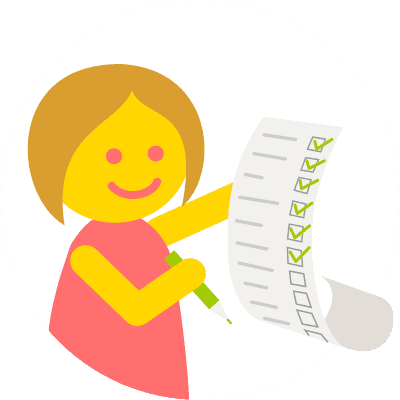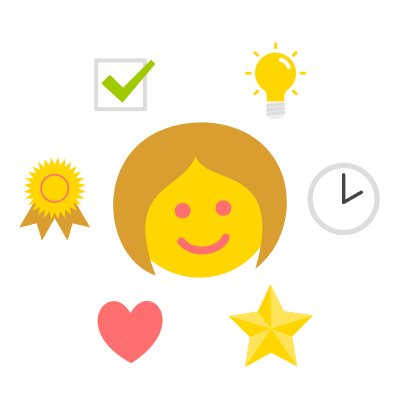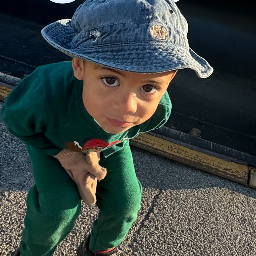Babysitting Interview Expectations: (Phone, Video & In-Person)


Written & Illustrated by
Matthew James Taylor
Kidsit Founder, General Manager

Babysitting video by
Lydia Kutz
Babysitter, Infant Swimming Resources Instructor

Reviewed & Edited by
Renee Irving Lee, B.Ed.
Special Education Teacher, Swim Coach, Childrens Author
Key Takeaways
- Be Prepared for Various Interview Formats: Expect interviews to be conducted via phone, video call, or in person. Each format may have different expectations and preparation requirements.
- Demonstrate Your Experience and Qualifications: Be ready to discuss your babysitting experience, work history, qualifications, and references. Highlight any certifications or training you've completed.
- Engage with the Children: For in-person interviews, you may be asked to meet the children to assess compatibility. Be prepared to interact with them in a friendly and engaging manner.
- Dress Appropriately: Wear comfortable, smart-casual attire that is suitable for interacting with children and reflects professionalism.
- Ask Thoughtful Questions: Prepare questions to ask the parents about their expectations, the children's routines, and any specific needs. This shows your interest and commitment to providing quality care.
- Follow Up After the Interview: Send a thank-you message to express appreciation for the opportunity and reiterate your interest in the position.
An interview for a babysitting job can be intimidating. Whether this is your first-ever interview or you've been through it before, it still can be a very stressful experience. You want to make a great impression and do everything possible to land that babysitting job.
What should you expect at a babysitting interview? Expect to be asked questions about your babysitting experience, work history, qualifications, and references. For in-person interviews, you may be expected to meet the children to see if you get along with them. Be sure to dress comfortably and ask lots of questions to show interest in the job.
In this article, I'll walk you through the four major steps of the babysitting interview process:
Lydia has been working in the childcare industry for 15 years, and owned a childcare agency in Florida, USA for 7 years. She has been through countless babysitting interviews both as a babysitter and as an employer. In this video, she gives her best tips for making a good impression during the interview process.
The Babysitting Interview Process
There's more to a babysitting interview than just the 20 or 30 minutes that you'll spend talking to your potential employer.
Sure, you need to do the right things during your interview, but the choices that you make before and after the interview are really important as well!
Personally, I like as much information as possible whenever I'm going into a new or uncertain situation. So I'm going to walk you through every step of the interview process that you might have questions about.
1. How Do You Get A Babysitting Interview, To Begin With?
Before you can get a babysitting job, you're going to need to get an interview. But how do you get parents to consider hiring you as a babysitter and take time out of their busy schedule to talk to you?
With most jobs, it's all about who you know. And when it comes to babysitting, it's no different! A major way to find parents willing to interview you for a babysitting job is through word of mouth.
Get your family and friends to watch for anyone they know who might be looking for a babysitter, and they can put in a good word for you! This is how most new babysitters get their start.
If you want to expand your potential clients even further, you can look for babysitting jobs online.
Join Facebook groups specifically for parents in your city and make a post advertising your services as a babysitter. That way hundreds or thousands of people will potentially see that you're looking to babysit.
You can also join a babysitting website, like Kidsit (create a free profile).
Read my profile writing tips if you want to stand out from the competition!
Finding Out That You Have An Interview
If a parent hears about you and thinks they might be interested in hiring you to babysit, they'll reach out.
When you're using a babysitting website, you'll receive a private message or email from them. If someone you know gave them your information, you'll probably get a phone call or text message instead.
From here on, treat every interaction you have with the parent as part of the interview. You want to be sure to make a positive impression, even if you're just replying to say you'd be interested and set up an interview!
The parent who wants to hire you will set most of the details and you'll agree on a time that works for both of you.
It's important to figure out what type of interview it's going to be. Some parents just want a quick phone interview before they meet you in person. Others will want to do a video call through Skype or Facebook. Some will just meet you in person right away. There are some little tips and tricks that are different for each style of interview.
Researching Your Interviewers
When going for an interview with a company, it's a good idea to research their history and what they're all about. Companies have websites that make this easy, but it's harder when you're interviewing with other individuals!
There are some things you can do to get to know the person you'll be interviewing with a bit better though. That way you'll know more about them and will have a better idea about what to expect from the interview, and from working for them down the road.
The first step I would take is to ask friends and family who know them. Unless someone reached out to you from a posting you made online, then someone likely referred you to the family who is looking to hire you as a babysitter.
Ask your connection what kind of family they are:
- Are they serious or strict?
- What kind of things are important to them?
- What kind of hobbies and interests do they have?
If you have a mutual friend on a social network like Facebook with your interviewer, you may be able to get some information about them from there too. Personally, I really like to put a face to a name if at all possible before I go and meet with an interviewer in person.
Just don't be creepy with it!
You can take this too far and learn everything your interviewer likes and dislikes and bring it up in your conversation. This will come off sort of weird and they'll wonder if you've been stalking them. But if you can pick out just one or two things that you genuinely have in common with them, it can be a great ice breaker and help to build rapport.
2. How To Prepare For Your Babysitting Interview
How you prepare for your interview depends on what kind of interview it's going to be.
Phone Interviews
If it's a phone interview, be ready and waiting to answer your phone 5 or 10 minutes before the time that the parent says they're going to call you. I recommend finding a quiet room where you won't be disturbed. Have a pen and paper ready to take notes since you'll likely be discussing dates and times where you'll need to be next.
A phone interview is nice because you don't need to leave the house and go for your interview somewhere else. You can do the interview in your pajamas if you want!
But phone interviews also have the drawback that the person you're speaking to can't see you. They only have your voice to base their opinions off of, not your expressions or body language. For that reason, I would avoid using sarcasm over the phone, which is easier to misinterpret than in person.
Really put an emphasis on trying to sound positive and cheerful during your phone interview.
Video Chat Interviews
In a Zoom interview I like to see people that look professional, their hair is combed, they look put together, they don't look like they've just got out of bed, they don't look like they're going out for the night to a party, they look presentable.
I like eye contact, I know it can be hard if you're nervous or if you don't have the confidence or lack the confidence but it is important to me that you are showing me a little bit of confidence, you are confident in knowing that you have the skills and ability to do the job.
I also look for a little bit of personality... it kind of gives me a bit of an idea of what my client's kids are going to get when I send you to their house. If you have a bubbly personality I want to know that, if you have a more reserved personality I understand that and some of my client's kids need that.

Babysitter, Infant Swimming Resources Instructor
St Petersburg, Florida, United States
If you're having an interview via video chat, it's sort of like a hybrid between a phone and in-person interview.
Since they'll be able to see you, you should get dressed up a bit as if you were going for an in-person interview.
Again you'll want to find a quiet and well-lit area where you won't be disturbed. Try to pick somewhere with a fairly neutral and non-distracting background behind you, and be ready to answer the call at the agreed-upon time.
When you're video chatting, try to hold the camera at eye level. If you have the camera too low, it will give a less flattering appearance.
If you have a computer with a webcam, you might want to do your video chat using that instead of your phone. The camera will probably be of a higher quality. Plus your computer most likely has a better and more consistent internet connection than your phone does, so there's less of a risk of connection problems.
In-Person Interviews
For an in-person babysitting interview, you'll want to figure out where you'll be meeting and how to get there. If it's an unfamiliar place, I'd recommend doing a trial run a day or two before your interview so that you're sure you can get there without getting lost, and you'll know exactly how long it will take.
In-person babysitting interviews can take place in a family's home, or in a public place like a coffee shop or a library. But regardless of where the interview is going to take place, the format and things that you'll discuss are generally the same.
What Should You Wear To A Babysitting Interview?
In general, I recommend dressing a step or two up from your regular everyday casual clothing for a babysitting interview.
While a button-down shirt and tie might be the norm if you're interviewing for a job in an office, it would seem a bit out of place to wear a suit or overly formal clothes to a babysitting interview.
You want to wear practical but neat and tidy clothes for your interview. The sort of thing you'd wear to babysit a child. Your clothes should be comfortable and you should be able to run around and bend over in them, but not have any stains or tears.
For more information about how to dress for a babysitting interview, check out my article: What To Wear To A Babysitting Interview.
Personal hygiene is important for your interview as well. You can be dressed nicely, but if your hair is a mess or you haven't showered it can really harm your chances of getting hired.
What Should You Bring To A Babysitting Interview?
At a bare minimum, you should bring a couple of copies of your babysitting resume and a pen and notepad with you to your babysitting interview.
There are some other things parents will often want to see that you can bring too. That way you'll save time having to show them later or send documents to them.
I recommend bringing a list of references that a potential employer can use to contact people you've previously worked for.
(See our guide to babysitting references to learn what they are and how to get them.)
You'll also want to bring copies of any licenses and certification that you've got, such as for CPR or First Aid training.
If you normally bring a portable first aid kit to your babysitting jobs then make sure you tell the parents about this during the interview (here's the first aid kit we recommend).
It's also a good idea to bring personal identification such as a driver's license or passport. Parents understandably want to verify that you are who you say you are before they let you into their home to watch their children.
They may also want personal information from you so that they can run criminal record checks and other background checks on you, with your permission.
For other essential items to bring, check out my article: What To Bring To A Babysitting Interview.
Show Up On Time
Being punctual for your babysitting interview is super important. If you can't show up on time for the interview, how will parents know they can trust you to be reliable and show up when they need a babysitter?
Being late just makes you seem unprofessional and disorganized. In many cases, showing up late will ruin your chance of getting the job before the interview has even started.
I would much rather be 10 minutes early for my interview than 10 minutes late!
If you arrive at a public place like a coffee shop early you can just wait for them to arrive. And if you get to an interview at a family's home early, you can wait outside in your car or just take a quick walk around the block to use up any extra time.
3. During The Job Interview
Just making it to your babysitting interview is half the battle! If you've made it this far, it means the parents have a real interest in hiring you and you seem to meet their needs.
Now all that's needed is to prove that you're right for the job and that your personalities don't clash.
My best advice for a babysitting interview is just to be yourself. There isn't a huge amount you can do to change how a specific parent thinks about you. However, there are some things you can do to prepare.
What Should You Talk About?
For the most part, the parent interviewing you will handle the general flow of the conversation.
You shouldn't need to worry about carrying the conversation much besides your introduction and maybe a little bit of small talk.
Most parents are busy and will get right into their interview questions.
The big things are to smile, be polite, and try to talk as much as possible.
Being positive goes a long way in an interview. Nobody wants an apathetic babysitter. Talking negatively about your previous employers doesn't come off very well during an interview either.
Try to give complex answers to questions and avoid giving a simple yes or no. It's hard for your interviewer to get to know you if you're only giving one-word answers!
Try to avoid using filler words like "um" and "ah" as much as possible too.
Just be honest and tell the truth. It's not worth exaggerating or lying, because if a potential employer catches you it could be really awkward and ruin any trust you've built up.
If the children are there during your interview, be sure to interact with them and not ignore them too! Ask them basic questions like what their names are and how old they are. Parents want to see that you're able to build a relationship and relate to their children.
Finally, be aware of your nonverbal communication. Your body language and the tone of your voice can say just as much as your words do! (source) Avoid crossing your arms or other closed-off body languages.
Practice Interview Questions That You Might Be Asked
There are some common interview questions that are likely to come up for most babysitters. It's a good idea to think about these questions ahead of time and come up with answers for them. That way you won't be put on the spot. Nothing is worse than having your mind go blank when you're trying to come up with an answer!
"What's your hourly rate?" At some point during the interview, your pay is going to come up. Parents may just offer you what they're willing to pay, or they might ask you how much you're expecting.
If at all possible, it's best to let parents say how much they want to pay first. They might be willing to pay you more than what you plan on asking for. But if you give them your lower price first, they'll only pay what you're asking for and not anymore.
If a family is offering to pay less than what you're willing to accept, try to justify your higher price based on your experience, qualifications, and other factors that make you worth the cost.
Average Babysitting Rate Per Hour By Country
(Calculated weekly from our live member data — Updated 31 Jan 2026)
| Country | 1 Kid | 2 Kids | 3+ Kids |
|---|---|---|---|
| United States | $16.82 | $18.50 | $20.18 |
| Canada | $18.36 | $20.20 | $22.03 |
| United Kingdom | £11.39 | £12.53 | £13.67 |
| Australia | $26.79 | $29.47 | $32.15 |
| New Zealand | $22.76 | $25.04 | $27.31 |
Babysitting rates vary by region so search for your exact location to get a more precise estimate.
See our essential guide: How To Negotiate Your Babysitting Rate to learn some helpful strategies.
"When are you available?" Parents understand that if you're a student, you're probably only available to babysit during evenings and weekends. If you have any extracurricular activities or other engagements it's a good idea to have these in mind though. That way you can let them know right away what days you won't be able to work.
"What is your experience?" Parents will want to know how long you've been babysitting for, and what ages of children you've babysat in the past. They'll also be interested in whether you have any special training like CPR or First Aid. (See our complete list of babysitting qualifications.)
"What do you like best and worst about dealing with children?" If you enjoy babysitting, it should be easy to think of the most rewarding parts of the job for you. For the worst part about babysitting, try to find something humorous or something that everyone hates like changing diapers if you get asked that one.
Parents could ask all sorts of other questions about transportation, staying late, how you handle discipline, what activities you would do with the children, and more.
It's worth researching what questions you may be asked. You could even be sneaky and read our article for parents on this subject: 43 Babysitting Interview Questions, you never know your luck, perhaps they've been preparing by reading Kidsit too! ;)
Have Your Own Questions Ready
During the interview, you should have at least a few of your own questions that you want to ask about the family, their children, or their expectations of a babysitter.
Your questions can be pretty much anything related to those topics. It doesn't necessarily matter what your questions are, as long as you have some. That shows you're really interested in the position.
If you're having your interview at the family's home, you might ask for a tour of the house or to meet the children as well. (See our guide to meeting children for the first time)
I also suggest that you read our questions to ask parents and print our checklist to take with you to the interview.
4. After The Babysitting Interview
Once the interview is done, it's not all over yet! There are still a few more things between when you have your interview and when you are accepted and you start the job.
Some parents may immediately offer you a job once they've talked to you. Others might be interviewing other possible babysitters as well and let you know that they'll need a few days to get back to you.
The first thing to know is to not freak out! It's normal to feel nervous and unsure at all stages of the interview process. Before, during, and especially after. When you get home from the interview, you'll probably be playing it back in your mind and thinking of all the things that maybe you should have done differently.
I recommend taking some time to unwind after your interview. Do something you enjoy like watching your favorite show or going to see a movie. You could also go for ice cream with a friend and discuss how you think the interview went. Sometimes it helps to talk about the experience and get it all out instead of stewing about it.
Following Up After Your Babysitting Interview
After your babysitting interview, I'd recommend sending a quick message to the person who interviewed you just to say thank you.
You can keep it short. Even just a quick text message will let them know you're really interested in the job.
Say something like "Thanks for taking the time to meet with me today. It was a pleasure meeting you and I hope to hear back from you soon." Avoid coming on too strong or making too many assumptions.
Following up is something not all babysitters will do, and it can help set you apart if the family is interviewing several people.
Hearing Back From The Family
You should expect to hear back about whether you've got the job within a few days in most cases.
Don't be disheartened if it's no. I don't know anybody who has successfully gotten 100% of every job they interviewed for!
Some employers won't reach out to you unless you've got the job since it can create a bit of an awkward situation for both parties.
If you want to be sure they haven't just forgotten about you, follow up after a week or two and find out if they've made a decision.
When you don't get a job that you interviewed for, it can be helpful to ask your interviewer why you didn't get it. Often parents will give you valuable feedback on why they decided to pick another babysitter instead of you. Whether it was based on experience, qualifications, or something else.
Often their answer can give you something to work on to maximize your chances of getting hired by another family in the future!
Taking The Next Steps
If you didn't get the babysitting job that you interviewed for, it's back to the drawing board! Time to find some more families to approach about babysitting, or to start offering your babysitting services online some more.
If you did get the job, congratulations!
If a family lets you know that they want to work with you, discuss with them when your first babysitting job will be.
It's time to start prepping for your first babysitting experience with the family. Come up with some activities and ideas to do with the kids while you're babysitting them.
If you haven't created one yet, I'd also recommend putting together a babysitting binder. Check out my article for more information: How To Assemble A Babysitting Binder.
Conclusion
When it comes to babysitting interviews, most people only think about what's actually going to happen when you meet the parents. But there are important things that you need to do both before and after the interview that would be a mistake to neglect!
Before you go for your interview, you need to figure out what to bring and what's appropriate to wear. You should also practice common interview questions and come up with answers that you can apply to a variety of situations.
By preparing ahead of time, you won't likely be caught off guard during the actual interview and most of it will occur naturally and automatically.
Interviews are a stressful situation and it's too easy for your mind to simply go blank if you haven't prepared what you're going to say. Don't leave it up to chance!
After the interview, it's good to send a quick thank you message. If you don't hear back from the interviewer after a week or two, you may want to follow up. Interviewers sometimes give valuable feedback that may help you be more successful at your next interview.
Next:





























